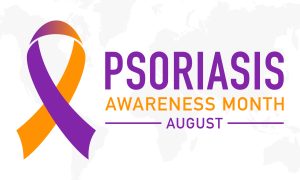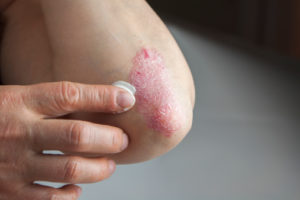 Psoriasis is a chronic skin condition that causes the formation of thick, scaly patches of discolored skin, also known as plaques. These rashes occur due to inflammation and can appear anywhere on the body, but typically develop on the elbows, knees, scalp, fingernails, toenails, palms, feet, lower back, genitals, face, and mouth. Over 3% of Americans have been diagnosed with psoriasis.
Psoriasis is a chronic skin condition that causes the formation of thick, scaly patches of discolored skin, also known as plaques. These rashes occur due to inflammation and can appear anywhere on the body, but typically develop on the elbows, knees, scalp, fingernails, toenails, palms, feet, lower back, genitals, face, and mouth. Over 3% of Americans have been diagnosed with psoriasis.
There are many types of psoriasis, including:
- Plaque psoriasis (the most common form of psoriasis)
- Inverse psoriasis (which causes plaques to form without a scaly texture)
- Guttate psoriasis (which can appear after a case of strep throat)
- Pustular psoriasis (characterized by pus-filled bumps that appear on plaques)
- Erythrodermic psoriasis (covering over 90% of your skin)
- Sebopsoriasis (appearing on your face and scalp with a yellow coloration and scaly texture)
- Nail psoriasis (which causes discoloration and pitting in your fingernails and toenails)
Psoriasis is an autoimmune condition, meaning that it is caused by your immune system functioning abnormally and attacking healthy cells; this results in the inflammation that causes plaques on the skin. Psoriasis also significantly speeds up the production of new skin cells, causing scales and frequent shedding. Approximately one in three people diagnosed with this disorder may also be diagnosed with psoriatic arthritis, another autoimmune condition that causes swelling and pain in your joints.
Symptoms of psoriasis are not necessarily constant. They typically occur during periodic flare-ups, which may develop in response to certain factors or elements of the environment. Some common triggers for psoriasis include stress, infections such as strep throat, skin injuries, medications such as lithium and beta-blockers, and body temperature shifts in response to weather conditions.
Many cases of psoriasis may respond well to treatment options such as steroid creams, moisturizers, medical lotions or shampoos, vitamin D3 ointment, vitamin A or retinoid creams, and medications such as anthralin which slow down the production of new skin cells. If these options do not treat your symptoms effectively, your doctor may recommend light therapy, immunosuppressant drugs, and other, stronger medications.
If you are experiencing symptoms of psoriasis, you can receive specialized treatment from a dermatologist at Flushing Hospital Medical Center. To schedule an appointment, please call (718) 670-5486.
All content of this newsletter is intended for general information purposes only and is not intended or implied to be a substitute for professional medical advice, diagnosis or treatment. Please consult a medical professional before adopting any of the suggestions on this page. You must never disregard professional medical advice or delay seeking medical treatment based upon any content of this newsletter. PROMPTLY CONSULT YOUR PHYSICIAN OR CALL 911 IF YOU BELIEVE YOU HAVE A MEDICAL EMERGENCY.

